| Reviews & Columns |
|
Reviews DVD TV on DVD Blu-ray 4K UHD International DVDs In Theaters Reviews by Studio Video Games Features Collector Series DVDs Easter Egg Database Interviews DVD Talk Radio Feature Articles Columns Anime Talk DVD Savant Horror DVDs The M.O.D. Squad Art House HD Talk Silent DVD
|
DVD Talk Forum |
|
|
| Resources |
|
DVD Price Search Customer Service #'s RCE Info Links |
|
Columns
|
|
|
Rumpole of the Bailey: The Complete Series
"Knowing the law has almost nothing to do with being a lawyer."
"Will he ever learn?"
"I'm afraid, never."
After decades of watching British TV...I finally get to meet Horace Rumpole. For the second or third time, A&E has repackaged Rumpole of the Bailey: The Complete Series, this time in an attractive (and entirely affordable) Union Jack-wrapped slimcase 14-disc megaset containing all 42 episodes (minus, unfortunately, the pilot teleplay) of the John Mortimer-written series that ran in the U.K. from 1978 to 1992, starring the irrepressible Leo McKern. No new extras here; however, the space-saving slimcase packaging is a plus, along with that heavily-reduced price (at one point, this set was down to forty dollars on Amazon)―both perfect incentives to put this on your "must have" list for 2011.
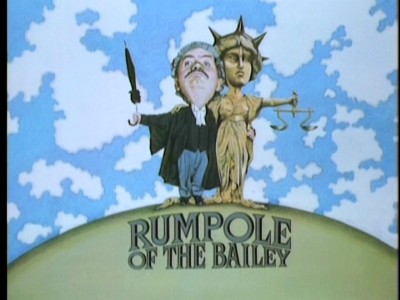
Just a little bit of background on the story, for those (like myself) who may be coming to the series new. Grumpy, aging London defense barrister Horace Rumpole (Leo McKern) lives, apparently, for only one thing: the courtroom. Yes, of course he gets corporeal pleasures from his stinky, inexpensive cheroots and his cheap red wine, or the feeling of his crushed, battered fedora on his head. But these rather humble staples of life are offset by the truculent waspishness of his (mostly) disapproving wife, Hilda (Peggy Thorpe-Bates and Marion Mathie), who has been secretly dubbed by the fearful Rumpole with the H. Rider Haggard moniker, "She Who Must Be Obeyed." Eternally disappointed in Horace's failure to either "take the silk" (become a senior "Queen's Council"), or become a judge or even merely Head of Chambers, a position held by Hilda's beloved, now-passed "Daddy," Hilda splits her snappish frustrations between Rumpole's lack of ambition and his deliberately provocative behavior. A "character" in the best sense of the word, with a simple credo ("Never plead guilty!"), Rumpole has zero respect for judges who hand down verdicts in their minds before their cases are even heard, or coppers who fabricate evidence, or even some of his clients, who attempt to use the wily defense barrister for their own convoluted scams.
Those that work with Rumpole aren't spared his deflating sarcasm, either. Vain ladder-climber Guthrie Featherstone (Peter Bowles) has decidedly mixed feelings for the snarky old charmer, preferring to have the superiorly-skilled Rumpole out of Chambers altogether, rather than suffer his withering, patronizing digs at Featherstone career-hops to QC and finally, the High Court as a judge. Hapless Claude Erskine-Brown (Julian Curry) feels no great love for Rumpole, either, since Rumpole continuously shows up Erskine-Brown as a clueless womanizer and worse, an inept barrister. Phyllida Trant (Patricia Hodge) observes Rumpole with a mixture of irritation and amusement, but she's more intent on cheating on her cheating husband, Claude Erskine-Brown, as well as leap-frogging Claude to the judges' High Court. Pious stuffed shirt "Soapy" Samuel Ballard (Peter Blythe), Head of Chambers, actively tries to get rid of the "embarrassing" Rumpole on numerous occasions, objecting to his clothes, his insolent manner, and Rumpole's penchant for low-brow cases of theft and murder, all usually done for (a late-paid) Legal Aid fee. However, no amount of pushing from his colleagues, or insults from his wife, can keep this "Old Bailey hack" away from what he truly loves: holding a jury rapt, as he raps the knuckles of a willful judge.
SPOILERS ALERT!
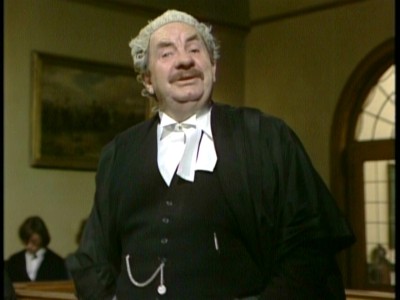
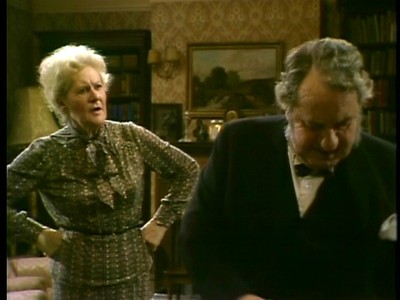
Even though I feel like I've spent my entire life in front of the tube, there are going to be shows that I've missed over the years (logistics alone would demand that), regardless of how good or popular or essential those shows were. Now, I certainly heard about Rumpole of the Bailey when I was a kid, and over the years, as it showed up on PBS' Mystery!, I'd read about it, or hear a friend or relative discuss it. Somehow, though, for whatever reasons, it never made it to my remote...which is a shame, because after watching these 35+ hours, I found Rumpole of the Bailey to be an absolute delight, and one of my favorite "new" shows, old dear.
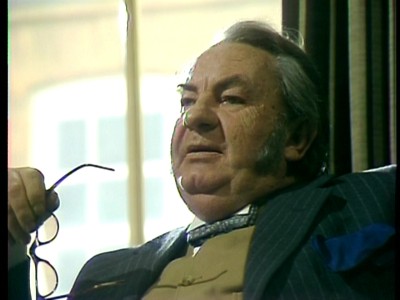
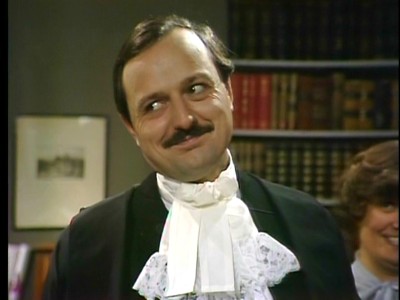
Since Rumpole of the Bailey has been an international favorite for decades now, I doubt I'll be writing here to very many new fans of the show. My impression of the series has always been that it was a comedy, and certainly, by the later seasons, the sophisticated, satirical elements of Mortimer's scripting dominates. However, I was a little surprised at the more dramatic (and frankly, sad and depressing) aspects of that first series ("season" in Brit-TV language). McKern, narrating a mournful voice-over, admits to all manner of introspective melancholy, particularly when it involves his marriage ("hard, back-breaking work," without a hint of sarcastic humor) and his career (in Rumpole and the Learned Friends, Rumpole cops to the deepest existential angst, wondering who "he" really is). In Rumpole and the Married Lady, Rumpole discovers at the end of the episode that he seems to have very little reason to remain married to Hilda (and she, as well, to him), preferring a "war together than a lonely peace," a verdict on their marriage that's quite sad...and one that you won't see in later seasons, when their bickering takes on a more classically farcical tone. As for his work, there are quite a number of episodes where clients take on the aging barrister in an effort to have him lose their case on purpose―plans that usually backfire comically on the defendants. But in Rumpole and the Heavy Brigade, McKern plays this first deception by a defendant as an act of personal betrayal that seemingly shakes him to his core (they also cruelly throw in that they picked him because he was old). As well, when the series begins, and Mortimer immediately fades out the Nick character (David Yelland), the son that's especially close to Rumpole and who seems to understand his eccentricities without judgment, the feeling early on in the series is that Rumpole is largely alone in the world, without too many sympathetic supporters.
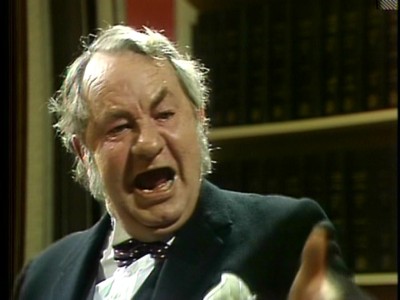
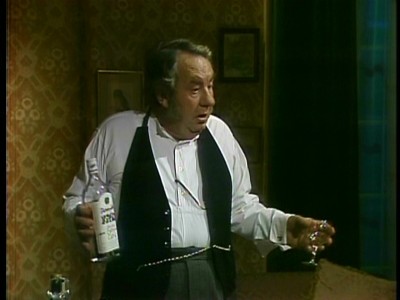
And that aesthetic would be valid, if the series had stayed in this rather gloomy vein (there's a way someone could re-boot the character now: go darker). Happily, Mortimer lifts the character's spirits noticeably after the first series, and we're treated to snappish satires of the British legal system, as well as a farcical examination of the treacherous waters known as the Rumpole marriage. I know Rumpole's supposed politics have been discussed in other reviews and articles I've read on the series, but aside from some rather obvious statements about helping the downtrodden and screwing with the rich and powerful, Rumpole comes off to me at least as a total absurdist, best exemplified in his exchange with the dim-witted Erskine-Brown: "Please, this is not a joking matter," a desperate Claude implores Horace, to which Rumpole replies, with a hint of both fatalism and delight, "Everything, in my humble opinion, Claude, is a joking matter." That's hardly the credo of a committed ideologue of any stripe. Everything is fair game for Rumpole's cynical observations, regardless of politics, philosophy, or morality. If one insists that Rumpole cross-examines to the Left, Mortimer is careful to let Rumpole skewer anything that smacks of pretense or opportunism in the name of convenient morality/politics. Indeed, it would make for a fascinating thesis to compare the "liberal" Rumpole and his personal politics of the 70s and 80s, with the nanny-state restrictions of England today (a direction the series seems to be going towards, with the clashes between Rumpole and Probert); I have a feeling he'd be marked tout de suite for re-education...if he survived all the P.C. lawsuits filed against him.
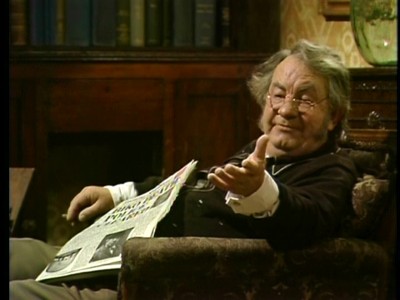
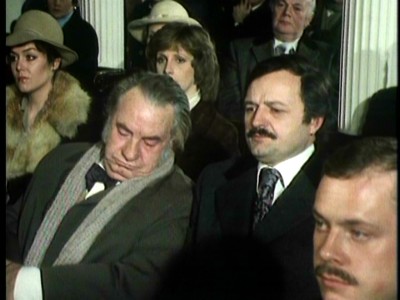
No, what I suspect people find continually inviting about the series aren't its politics or sociology, but the high-gloss verbal wit continually on display, and the appeal of the Rumpole character himself, forever welded to Leo McKern's absolutely cuddly (my wife's verdict) turn as the perpetually put-upon barrister. Having grown up on generally infallible TV lawyers like Perry Mason or my long-lost favorite, Owen Marshall, Counselor-at-Law (when is someone going to release that on DVD?), it's quite fun to see a wild-and-wooly barrister like Rumpole who freely admits he knows very little of "actual" law. Lying continually to potential clients about his level of knowledge concerning specific case law, Rumpole relies on logic, deduction, argument, and perhaps most of all, florid, peevish performances in the courtroom to sway juries...while verbally smacking judges on the their snouts just for the sport of it. Of course, such a character could very well turn broad if unleashed without care, but the Jedi-like iciness of Mortimer's British humor here insures that Rumpole remains always in check, restricted even more by Mortimer's unsentimental, reliable plot machination of having Rumpole's co-workers continually trying to oust him from Chambers. We love Rumpole, but his co-workers―even the ones who maintain a grudging respect or limited affection for him―would like to see the back-end of him at every turn. It's an effective technique to get the viewer on Rumpole's side, cheering him on to craftily win out over his lying clients, bullying judges, and devious co-workers.
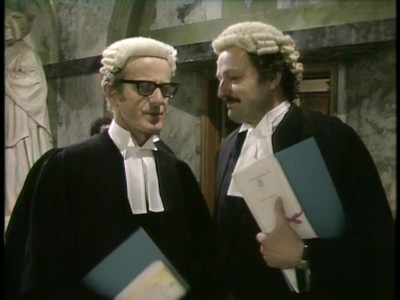

As for McKern...what can one write about his turn as Rumpole that hasn't already been written? With a rubbery face that looks like it's melting under hot lights, and one roving eye that more than makes up for the other eerily placid false one, the overall effect is highly comical, until that rolling, buttery/rasping voice stentoriously blasts out, silencing his tormentors. I understand that other actors have since played Rumpole, but like other great actor/character match-ups (Gable and Butler, or Leigh and O'Hara, for that matter), I can't conceive of watching someone else portray the Old Bailey hack, without running a continuous comparison track to McKern in my head. With the help of Mortimer's subtext of a deeply melancholic Rumpole who literally only has his love of practicing in the courtroom to sustain him, McKern can explore various layers of the character beside the more obvious comic one, including the most poignant of these: the frustrated Romantic Rumpole (there are a few episodes that show Rumpole getting his heart broken when offers of young, spirited, poetic love are shown, in the end, to be ruses). Luckily, though, Mortimer, and through his delivery, McKern, keep the laughs coming at a remarkable rate (there are a plethora of quotable lines throughout the series; my favorite from Rumpole: "Oh, Hilda doesn't look for happiness...she looks for responsibilities of command."). It's difficult to choose a favorite or representational moment out of so many episodes (obsequious Featherstone―brilliantly played by one of my favorites, Peter Bowles―trying and failing to throw a golf game is hilarious, as is any scene with blustery, bored Bill Fraser as Rumpole's chief nemesis at the Queen's Court, Judge Roger Bullingham). However, if I had to pick, I'd say Rumpole and the Heavy Brigade, where everyone at Chambers becomes obsessed with Rumpole's disheveled appearance, contains a perfect distillation of the various comedic techniques Mortimer utilizes, including a remarkable bit of farce where a preoccupied judge keeps gesturing to an incredulous, thrown Rumpole to fix his tie (it's really a joy to watch McKern in action). Spread out over fourteen years, Mortimer's and McKern's efforts here in Rumpole of the Bailey remained astonishingly consistent...and consistently hilarious.
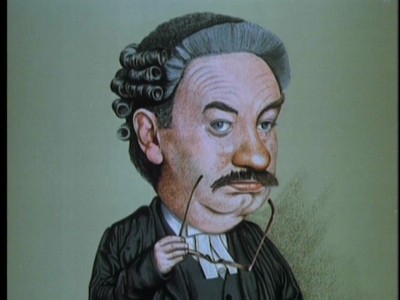

Here are the 42 episodes of the 14-disc set, Rumpole of the Bailey: The Complete Series, as described on the discs' slimcases:
SEASON ONE, DISC 1
Rumpole and the Younger Generation
Rumpole defends Jim Timson, accused of robbery with violence by a member of the Molloy family. Young Timson's only alibi involves another member of the same family.
Rumpole and the Alternative Society
Visiting an old chum from the Royal Air Force, Rumpole ends up on a commune defending a young girl accused of selling cannabis to a local policeman.
Rumpole and the Honorable Member
A politician accused of raping a party worker claims the sex was consensual. Rumpole thinks he can get him off the hook. Meanwhile, has his favorite clerk been caught stealing from petty cash?
Rumpole and the Married Lady
In the process of defending a woman against charges of infidelity, Rumpole unintentionally leads "She Who Must Be Obeyed" to believe he himself may have acquired a mistress.
SEASON ONE, DISC 2
Rumpole and the Learned Friends
Rumpole acts as junior to Guthrie Featherstone's defense of a safecracker who claims to have been framed by Inspector "Dirty" Dickerson. Will Rumpole's approach backfire?
Rumpole and the Heavy Brigade
While Rumpole defends a young man against murder charges, everyone's attention seems to be focused on his beaten and tattered bowler.
Rumpole and the Man of God
Rumpole finds himself defending a vicar accused of shoplifting. Unfortunately, and frustratingly, said defendant refuses to take the stand in his own defense.
SEASON TWO, DISC 3
Rumpole and the Case of Identity
Christmas brings Rumpole a case of mistaken identity. Meanwhile, is Guthrie Featherstone spending too much time behind closed doors with his new secretary?
Rumpole and the Show Folk
Rumpole travels north and goes thespian, defending an actress accused of murdering his cheating husband.
Rumpole and the Fascist Beast
Surprisingly, Rumpole agrees to defend an avowed fascist charged with inciting a race riot. Also, our loveable barrister has a new pupil.
SEASON TWO, DISC 4
Rumpole and the Course of True Love
When an exceedingly romantic young schoolteacher is accused of improper relations with a pupil, Rumpole comes to his defense, despite a damning bundle of letters.
Rumpole and the Age of Retirement
Percy Timson is accused of stealing the 14th-century painting of Christ that has been found in his garage. Meanwhile, Mrs. Rumpole and Nick make plans for Rumpole's retirement--in Maryland.
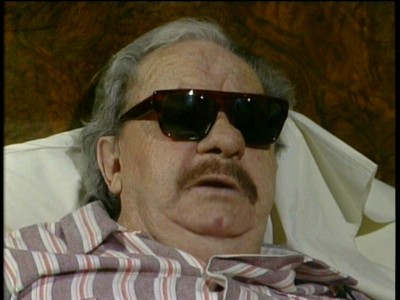

SEASON THREE, DISC 5
Rumpole and the Genuine Article
A struggling artist has been charged with painting a forgery. Rumpole's most telling clue may lie in the defendant's utter calm.
Rumpole and the Golden Thread
Rumpole flies to Africa to defend a former law pupil on a charge of murder. Local politics, tribal conflicts, and a complete lack of alibi make for quite a challenge.
Rumpole and the Old Boy Net
Rumpole and his new pupil, the beautiful Fiona, defend a well-respected couple from charges of blackmail and running a disorderly house. If only the defendants were more cooperative.
SEASON THREE, DISC 6
Rumpole and the Female of the Species
Smalltime crook Tony Timson is accused of driving the getaway car for a botched robbery. Meanwhile, Rumpole fights to get Fiona accepted into his chamber.
Rumpole and the Sporting Life
Rumpole takes a getaway to rural England but finds himself defending Fiona on a charge of murdering her once-philandering husband.
Rumpole and the Last Resort
"She Who Must Be Obeyed" takes an assist when she helps Rumpole call in some unpaid debts. Elsewhere, Rumpole defends a small-business owner on charges of fraud.
SEASON FOUR, DISC 7
Rumpole and the Old, Old Story
Rumpole leaves home after a snit with "She Who Must Be Obeyed" and defends a man accused of trying to murder his elderly business partner.
Rumpole and the Blind Tasting
Yet another of the Timsons is in need of Rumpole's services, this time for storing a cellar's worth of stolen wine in his garage.
Rumpole and the Official Secret
Rumpole comes to the defense of an elderly woman charged with revealing government secrets--namely, the tea and biscuits budget.
SEASON FOUR, DISC 8
Rumpole and the Judge's Elbow
A man is charged with running massage parlors as brothels, but Rumpole must defend the case with extreme discretion, as the reputation of an esteemed colleague is at stake.
Rumpole and the Bright Seraphim
Rumpole travels to Germany to defend a British soldier charge with murdering his unpopular sergeant.
Rumpole's Last Case
The Timsons require Rumpole's services yet again, but in the midst of the case, Rumpole seems to be wearying of the whole business. Will British law lose one of its greatest champions?

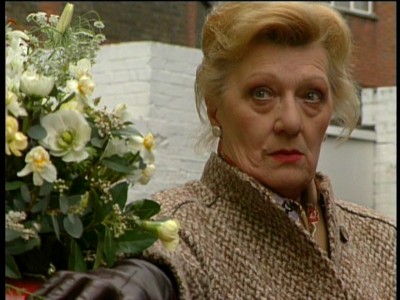
SEASON FIVE, DISC 9
Rumpole and the Bubble Reputation
Rumple takes the libel case of a young writer against a newspaper, while Claude, to the keen displeasure of Phyllida, moves in with Rumpole after being photographed at a seedy nightclub.
Rumpole and the Barrow Boy
Petty thief Nigel Timson has moved up in the world--straight into high finance. Back in chambers, Rumpole's clerk seeks the barrister's advice in matters of love.
Rumpole and the Age of Miracles
When a nephew clergyman is charged with adultery, Rumpole defends him in ecclesiastical court, while his colleagues Ballard and Erskine-Brown appear for the prosecution.
SEASON FIVE, DISC 10
Rumpole and the Tap End
While Rumpole again comes to the defense of a Timson, "She Who Must Be Obeyed" decides it's time for her to begin her own career in the legal profession.
Rumpole and Portia
Rumpole defends scrap dealer Stanley Culp, who is charged with selling arms to terrorists. The case comes before a newly appointed Recorder--Phyllida!
Rumpole and the Quality of Life
While suffering the hardships of a strict diet imposed on him by "She Who Must Be Obeyed," Rumpole defends Lady Perdita Derwent, charged with the murder of her elderly brother.
SEASON SIX, DISC 11
Rumpole a la Carte
Rumpole defends a star chef who served up live mouse to Erskine-Brown in a London restaurant, while Hilda falls for her Canadian cousin and loses all interest in Rumpole.
Rumpole and the Summer of Discontent
A trade unionist is charged with causing the reckless death of a truck-driver crossing a picket line. Back at chez Rumpole, Hilda declares she is going on strike herself.
Rumpole and the Right to Silence
Rumpole's client, a radical university lecturer, refuses to provide information in his own defense, while Hilda takes offense at Rumpole's advice on keeping secrets from wives.
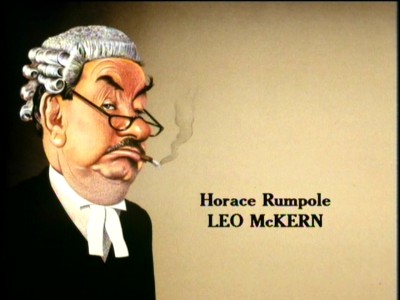
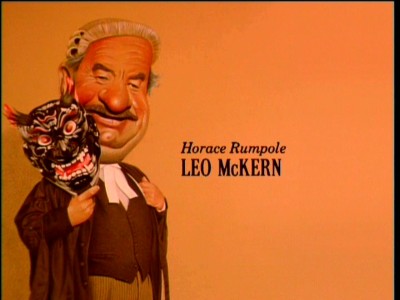
SEASON SIX, DISC 12
Rumpole at Sea
Begrudgingly, Rumpole takes Hilda on a holiday cruise, but his efforts to elude a High Court judge also on board end when a politician's wife goes missing.
Rumpole and the Quacks
Rumpole defends his doctor, charged with sexually molesting a female patient. Phyllida is counsel for the prosecution. Meanwhile, is Claude secretly looking for women friends?
Rumpole for the Prosecution
Rumpole agrees to act for the family of a dead girl in a private prosecution. At the same time Ballard asks Rumpole to prosecute Erskine-Brown for stealing work from a colleague.
SEASON SEVEN, DISC 13
Rumpole and the Children of the Devil
Once more Rumpole defends the Timsons, this time accused of Satanism. Meanwhile, Hilda wants Rumpole to escort her to this year's Scales of Justice Ball.
Rumpole and the Miscarriage of Justice
Rumpole defends Superintendent Gannon, accused of altering a suspect's confession to murdering a policeman. The Judge on the case finds himself in a spot of trouble as well.
Rumpole and the Eternal Triangle
A reluctant Rumpole defends the husband of a beautiful violinist. Meanwhile, Claude accuses a clerk at 3 Equity Court of sexually harassing a secretary.
SEASON SEVEN, DISC 14
Rumpole and the Reform of Joby Jonson
While defending a teen charged with breaking and entering, Rumpole's own apartment is burgled. Phyllida comes to the aid of Erskine-Brown's efforts to become a Queen's Counsel.
Rumpole and the Family Pride
Invited to a relative's castle, Rumpole finds himself defending his cousin against charges of murder. Some vacation!
Rumpole on Trial
Has Rumpole gone too far this time? Hilda must persuade Ballard to defend the Old Bailey hack in a disciplinary hearing.

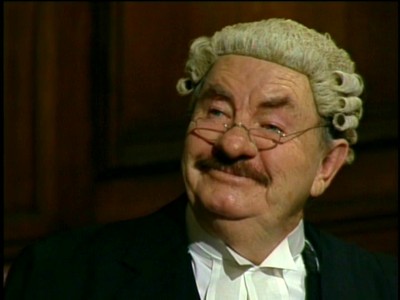
The DVD:
The Video:
The full-screen, 1.33:1 video transfers for Rumpole of the Bailey: The Complete Series is exactly what you'd expect from a British TV series from the 70s, 80s and 90s: the videography looks fairly primitive in the earlier seasons, with flaring, video noise and muddy colors, while the last years' efforts improve markedly. Fans of this type of show, though, won't care at all (in fact...we like that impoverished British look).
The Audio:
The Dolby Digital English 2.0 stereo audio tracks can show the limitations of the original recorded materials, with at-times fluctuating levels and hiss. Overall, though, the dialogue is clean enough. A lack of subtitles or close-captions doesn't help, though, with some of the faster accents.
The Extras:
From what I can gather by looking at the previous releases, nothing new has been added here. Each episode is introduced by the now-passed John Mortimer, giving a small, succinct background build-up for what's to come. On disc four, in addition to the made-for-TV movie, Rumpole's Return, there are some text bonuses, including a brief biography, selected bibliography, and credits for John Mortimer, as well as some info about the Old Bailey court and the "Official Executioners of Newgate Prison." On disc eight, an interview with John Mortimer, Mortimer's Musings from 2004 (when the episode introductions were filmed), is included. It runs 18:00. As well...the same text bonuses from disc four are copied over here. And on disc fourteen, an interview with Abigail McKern (the daughter of Leo McKern), McKern's Memories, is included. It's from 2005, and it runs 17:44. Running a quick 1:17, Spot the Barrister is a brief montage highlighting all the little cameos Mortimer made in the series. Running a mere :30 seconds, Newspaper Evidence is a throwaway showing a mocked-up newspaper prop from one of the episodes...with the football results substituted for a real article. And of course...the same text bonuses from the previous two discs are included here yet again.
Final Thoughts:
One of my "new" favorites. Rumpole of the Bailey is a brilliant mixture of author John Mortimer's icy British satire on the English legal system, and his wonderfully comedic portrait of the gruff, rumpled Rumpole, the aging barrister who's become a legend among the thieves and judges of the Old Bailey Court, brought brilliantly to life by the incomparable Leo McKern. If this repackage had one new extra, I'd give it our highest rating here at DVDTalk; as it stands, you can't beat the price and newly-compacted size of this 14-disc megaset. I'm highly, highly recommending Rumpole of the Bailey: The Complete Series.
Paul Mavis is an internationally published film and television historian, a member of the Online Film Critics Society, and the author of The Espionage Filmography.


|
| Popular Reviews |
| Sponsored Links |
|
|
| Sponsored Links |
|
|
| Release List | Reviews | Shop | Newsletter | Forum | DVD Giveaways | Blu-Ray | Advertise |
|
Copyright 2024 DVDTalk.com All Rights Reserved. Legal Info, Privacy Policy, Terms of Use,
Manage Preferences,
Your Privacy Choices | |||||||













